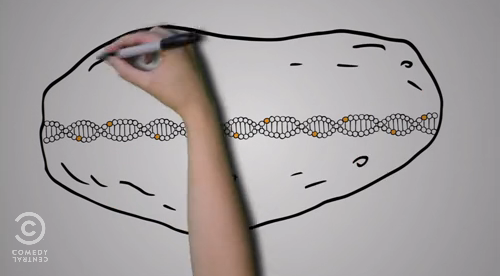GMO Potatoes Appeal To 'The Daily Show,' Who Says J.R. Simplot Isn't The Problem

Just last month, the U.S. Department of Agriculture (USDA) approved J.R. Simplot’s genetically modified potatoes. The potatoes are made to produce less acrylamide, a suspected carcinogen — and they are the latest in a long line of genetically modified organisms (GMOs) and crops. Many believe GMOs have adverse side effects on a person’s health, while others believe they’re equally safe and nutritious as conventionally developed foods. So, which is it?
The Daily Show correspondent Aasif Mandvi spoke with Jeffrey Smith, of the Institute for the Responsible Technology, and Walter DeJong, an associate professor of integrative plant science at Cornell University, to better understand both sides of the GMO debate. To Smith, genetically engineering any crop is dangerous; eating GMO potatoes might alter human gene expression, even cause death, he said. But to DeJong, Simplot’s potato does cuts down on possible carcinogens without posing any risk to human DNA.
“Our bodies have been slicing and dicing DNA for as long as we’ve been in existence,” DeJong said.
Turns out, this is the majority opinion among scientists. Mandvi cited a Pew Research Center report that found 88 percent of scientists believe GMOs are safe for consumption, compared to 37 percent of people who don’t believe them. And in a plot twist, Smith eventually reveals he's not a scientist. He merely interviews scientsits in an effort to make their findings more palatable for the general public.
What's more is the anti-GMO movement, DeJong said, has increased regulatory costs for anyone trying to develop genetically engineered crops; "only companies with deep pockets can play," he added. This leads Mandvi to conclude the greatest damage done by GMOs is by the people who believe eating these crops will kill them.
Watch the full segment below:



























